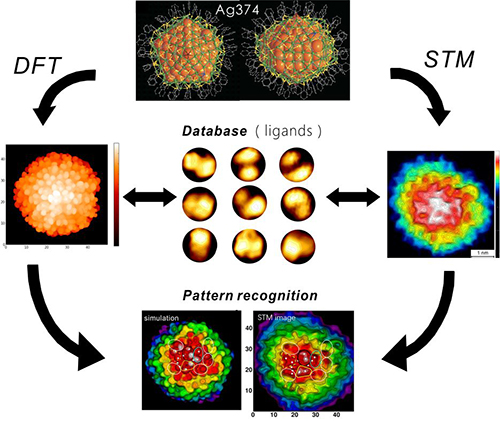High-resolution real-space imaging of nanoparticle surfaces is desirable for better understanding of surface composition and morphology, molecular interactions at surface, and nanoparticle chemical functionality in its environment.
However, achieving molecular or sub-molecular resolution has been proven very challenging, due to highly curved nanoparticle surfaces and often insufficient knowledge of the monolayer composition.
A research group led by Prof. YANG Xueming and MA Zhibo from the State Key Laboratory of Molecular Reaction Dynamics of the Dalian Institute of Chemical Physics of the Chinese Academy of Sciences, in cooperation with Prof. ZHENG Nanfeng from Xiamen University and Prof. Hannu Hakkinen from University of Jyvaskyla in Finland, investigated the surface structures of ligand protected metal nanoclusters with defined atomic structure by using low temperature UHV scanning tunneling microscopy as well as "Pattern recognition" algorithm.

Combination of high resolution STM images, DFT simulation and pattern recognition to resolve surface structure of nanocluster. (Image by ZHOU Qin)
The scientists demonstrated sub-molecular resolution in scanning tunneling microscopy imaging of thiol monolayer of a 5 nm nanoparticle Ag374 protected by tert-butyl benzene thiol. The experimental data was confirmed by comparisons through a pattern recognition algorithm to simulated topography images from density functional theory using the known total structure of the Ag374 nanocluster.
This work demonstrated a working methodology for investigations of structure and composition of organic monolayers on curved nanoparticle surfaces, which helped designing functionalities for nanoparticle-based applications.
The study entitled “Real-space imaging with pattern recognition of a ligand-protected Ag374 nanocluster at sub-molecular resolution” was published in Nature Communications. (Text by ZHOU Qin)